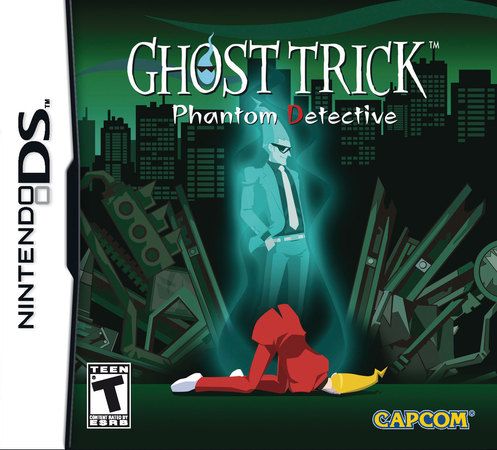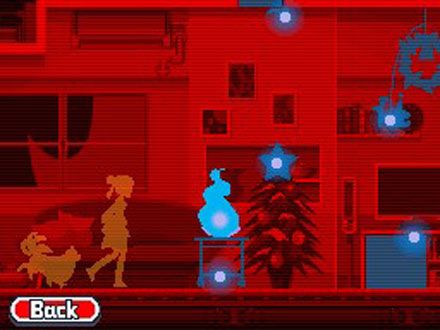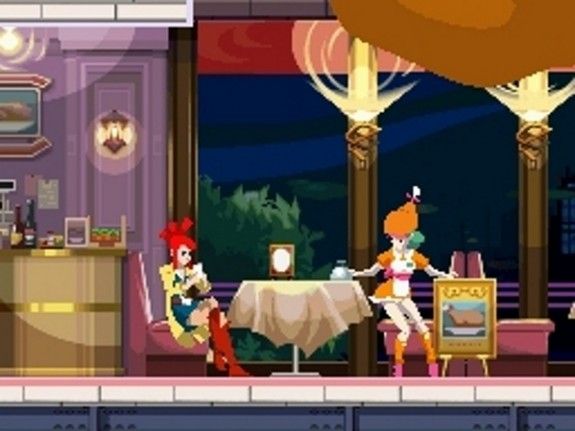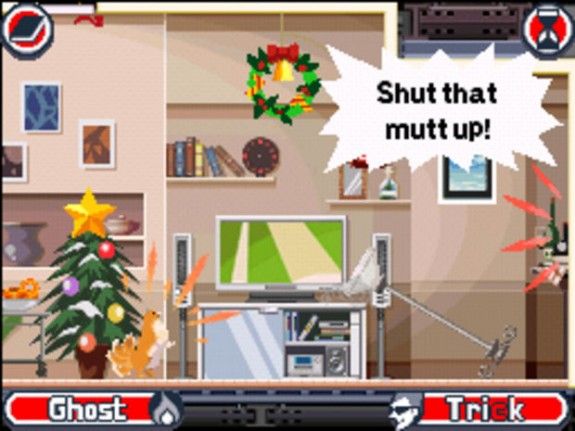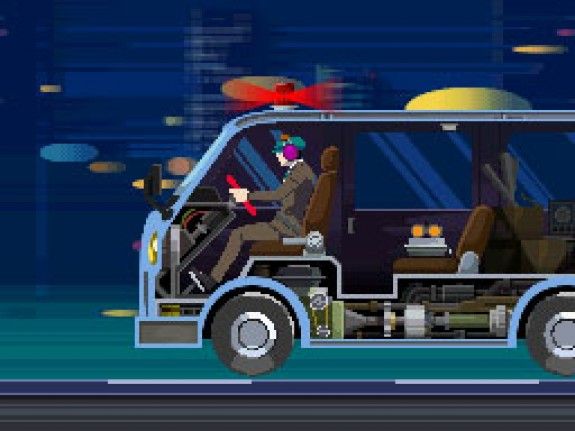Hey, you. Yeah, you, pimping the Gunnar shades, downing that Gamer Fuel, and chomping on that Gamer Grub. Come over here; there's something I want to ask you. What would you say about a game where you die at the very beginning and spend the entire game playing as a ghost? Sounds rad, right? Can you just imagine how TOTALLY-SICK-OFF-THE-HOOK-BALLER it'd be to be a badass ghost, control other people, and make them go insane and shoot up others against their will?
Well, how about if I told you that you couldn't possess humans, but as an apparition, were only granted the ability to inhabit inanimate objects? And what if instead of a gore-filled, action-packed shooter with disturbingly realistic graphics, it was a narrative-driven adventure puzzle game colored by vivid, stylized, undoubtedly "JAPAN!" characters?
...what, it sounds like a sizable piece of soft, smelly green baby poo? Okay, fair enough.
Let me lay this final bomb on you then: what if this adventure puzzle ghost game really did exist, and not only was it not poop, but very nearly close to a perfect game in every single way, shape, and form?
...shame, now your head's all exploded, and you won't be able to experience the straight up truth with Ghost Trick: Phantom Detective, an instant classic, and the game to play in 2011 so far.
So what makes Ghost Trick so fantastic? Let's start with the gameplay: as the protagonist Sissel, you have the power to inhabit inanimate objects and manipulate a select few of them in specific ways. Additionally, you can jump from object to object, as long as it's within your range. So, for example, you could possess a fan, and its "trick" would be to turn on and blow air at a flag, which would then flap within range to jump to another object that was previously unreachable. This all adds up to an ingeniously creative puzzle experience that gets more and more ambitious as the game progresses. Split up into chapters, you're essentially dropped into scenarios with a specific objective, most common of which is to prevent someone's death.
How does that happen, you ask? That's Sissel's final ability: when he comes across a dead body, he has the ability to "possess" that body, view that person's last four minutes before their death/murder, and travel back to that time to prevent that offense from ever occurring. The four minute time limit may initially seem to be an unnecessary obstacle, but it isn't exactly a time limit, per se. The passing of time isn't in real time; it actually seems to be triggered by certain events you come across during the game. If you do happen to screw up, you have the ability to start over from the beginning as many times as you want; often times you'll actually want to let the person die, just to see how things end up.
Strictly trying to prevent someone's death via puzzles may seem positively snoozeworthy, but rest assured; all of them are so delightfully innovative that you'll be ditching that sentiment immediately. Just watching a policeman's death unfold via a series of Rube Goldberg-esque events before attempting to prevent it sets your brain aflutter with the possibilities of objects to possess and utilize to get across the room. Over the course of the game the environments get progressively more intricate, until they feel intimidatingly cavernous, especially for a tiny ghost with limited abilities. At the same time though, they never feel impossible, and within moments you'll start to form a rough plan about how to traverse across such complex terrain to accomplish your task. It's indescribably satisfying figuring out how to prevent a woman from being squashed by a giant prop chicken in a multiple-story restaurant, where you start in a location seemingly deserted and isolated from any other controllable object. And right when the puzzles seem to get somewhat stale, Ghost Trick throws new creative elements and situations at you that feel downright brilliant and perhaps give you a taste of things to come in the inevitable sequels.
This puzzle element alone may actually be enough for a solid game, but it's the presence of an incredibly captivating plot that puts Ghost Trick over the top. In fact, the plot is perhaps the main star of the game; it's really what makes Ghost Trick special. A highly stylized send-up to noir mystery tales, the plot starts off with Sissel trying to figure out who he is and why he was shot, and it quickly branches out into a tale that ties together all the characters you come across in the game. It's light-hearted when it needs to be, but it often takes a turn for the shockingly morbid. It's not unexpected in a game that deals with death so liberally, but even so, the topics Ghost Trick strays into borders on subject matter that might be heavily censored on primetime television. Admittedly, I found myself slightly drifting out of interest about halfway through, but right when it felt like the game was running too long, a surprising (read: morbid) plot development occurs that brings you right back into it for the long haul.
Of course, with this ambitious plot also comes dialogue, which means a considerable amount of words and sentences to read. The wordiness might turn off certain gamers, but if you honestly didn't expect to read so much in an adventure game, this really isn't the game for you.
A sizable amount of compelling exposition really isn't a surprise, considering the guy in charge of Ghost Trick was Shu Takami, the genius behind the fantastic Phoenix Wright games. His mark is not only left on the plot, but also in the characters who will perhaps be the most vivid, memorable characters in a new original IP this year. While not as flamboyant and over the top as those found in the Phoenix Wright games, the characters in Ghost Trick are nonetheless equally memorable and full of life and personality. Prison guards who dance uncontrollably in times of great stress and panic, a police official that nervously takes off his shoes at his desk and "wrings" his feet, and an easily annoyable apartment tenant that delightfully clinks her glass of champagne when she says something witty, these are just a sample of the true characters in the game. And Inspector Cabanela, oh maaaan Inspector Cabanela. One of the most delightfully slick characters in gaming in quite a while, the guy is destined to be cosplay fodder this year, guaranteed.
The fact that Ghost Trick provides arguably the most impressive 2D graphics and animation on the DS certainly helps breathe life into these characters as well. I'm not quite sure what kind of deal Capcom made with the devil to get the animation this good on a portable like the DS, but keep doing it guys. The characters move so well, so naturally, and so fluidly that I kept myself constantly wondering if they were actually 2D sprites and not made of 3D polygons. There's no hitch in any of their movements, and no framerate drops or skips, it almost feels like motion capture technology was used.
And just in terms of graphics alone, Ghost Trick doesn't skimp out. Highly detailed, large environments are the main attraction here, with dynamic, colorful scenes and a sense of meticulous, expansive detail that's almost unrivaled in mainstream studio games these days. If you're like me, you won't appreciate how ambitious these levels were until about three-quarters of the way through the game, when a certain cutscene occurs that may rival the epic moments found in HD games like Modern Warfare and God of War 3.
Really, it's been four days or so since I've completed Ghost Trick, and I can't help but feel that a comparison to a game like God of War seems more and more appropriate. It's a game full of epic moments, both in terms of gameplay and in terms of graphics, and the climax really does kick you in the ass in a great, satisfying way. The things that are revealed in the last few moments of Ghost Trick may not only blow your mind, but it's all logically sound, and it's all the more impressive because of that. It's rare to find a game with a "time travel" element that has more than a gajillion plot holes, and Ghost Trick doesn't seem to have much, if any at all.
I could make a list of the negative aspects of this game, but it feels like I'm just trying to find an excuse to not be endeared to Capcom's latest masterpiece. The game is very straightforward and linear, but considering the pay-off, that's a nonfactor, and some of the puzzles may be a bit finicky and difficult, but hey, it's a puzzle game; that's how they generally are. Ghost Trick is truly the first must-play game of 2011, and I seriously cannot praise it enough. It's an instant classic, a narrative achievement, and destined to become the next new mega-franchise for Capcom.
-
Game: Ghost Trick: Phantom Detective
- Platform Reviewed: Nintendo DS
- Publisher: Capcom
- Developer: Capcom
- Release Date: Available Now
- MSRP: $29.99
- Review Info: A copy of this title was provided to DualShockers, Inc. by the publisher for the purpose of this review.

